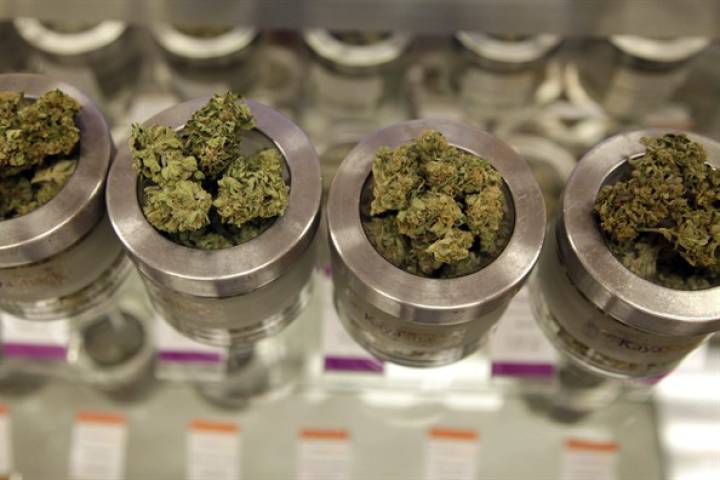Tourists visiting Colorado aren’t just buying marijuana now that it’s legal — they’re ending up in emergency rooms at rates far higher than residents, according to a new study.

Researchers reviewed data and found ER visits involving marijuana-using out-of-towners doubled from 2013 to 2014, the first year cannabis use was legalized in Colorado.
“What we didn’t expect is that the rates among out-of-state visitors would increase so dramatically,” Dr. Andrew Monte, a toxicologist and emergency-room physician at the University of Colorado Hospital told Global News.
The increase in visits by Colorado residents was “marginal” and “non-significant,” said Monte, adding “this suggests that there is some experience in the users.”
READ MORE: When will Liberals legalize recreational marijuana?
Even visitors who have used marijuana before coming to Colorado may find, “it’s a different product here, it does have higher THC concentrations than people may traditionally have been used to and there is a lot of different products that are available,” Monte told Global News, “so it’s certainly possible for them to get a much higher dose.”
Add to that, baby boomers who tried pot when they were younger, but since then have developed a health condition that would impact their heath if they used marijuana now.
Doctors reviewed marijuana-related emergency-room admissions. They found that the rate of emergency-room visits possibly related to marijuana doubled among out-of-state residents in the first year of recreational pot sales. The rate went from 85 per 10,000 visits in 2013 to 168 per 10,000 visits in 2014.
READ MORE: Court rules patients can grow own medical marijuana
- Canadian man dies during Texas Ironman event. His widow wants answers as to why
- ‘Sciatica was gone’: hospital performs robot-assisted spinal surgery in Canadian first
- Canadians more likely to eat food past best-before date. What are the risks?
- Treatment from female doctors leads to lower death rates, study finds
Researchers did not study what kind of marijuana the emergency room patients had used — whether it was edible or smoked cannabis.
Lead investigator Dr. Howard Kim, an emergency medicine physician and fellow at Northwestern University Feinberg School of Medicine said edible products such as cookies or brownies often have a delayed effect.
“People eating marijuana products often don’t feel any effect immediately, leading them to eat another edible,” Kim said. “Then they’ve ingested multiple products, so when the effect finally kicks in, it is much stronger.”
Advice for Canada
Monte’s advice to Canadians about the possible implementation of a legal recreational marijuana system — health education needs to precede the increased availability of the drug.
“Months before dispensaries open, there needs to be public health education efforts in order to mitigate any adverse health events,” Monte told Global News, adding when they do open the education needs to continue.
Monte also said coming up with strategies that are backed by public health and retail advocates will help reduce the adverse health impacts as well.
READ MORE: If Canada legalizes marijuana, how will cops combat high drivers?
Doctors in the study compared the hospital rates to data from the Colorado Hospital Association. That showed the rate among out-of-state residents rose from 78 per 10,000 visits in 2012 to 112 per 10,000 visits in 2013 to 163 per 10,000 visits in 2014.
Among Colorado residents, the rate of emergency-room visits possibly related to cannabis use did not change significantly between 2013 and 2014. Among Colorado resident emergency-room patients, 106 per 10,000 visits complained of marijuana-related ailments in 2013 and 112 per 10,000 visits complained of marijuana-related ailments in 2014.
Tourists and Coloradans also had different complaints related to marijuana. Coloradans across the time period mostly complained of gastrointestinal problems, while the most common ailment by visitors was psychiatric, including aggressive behavior and hallucinations.
Men were two to three times more likely than women among both groups to complain of cannabis-related ailments in emergency rooms. Coloradans were slightly younger than out-of-state residents, with a median age of 34 for residents and a median age of 35.5 for visitors.
The doctors said the difference between tourists and residents caught them by surprise.
The cases of both tourists and residents reporting feeling like they’d overdosed on pot were a “vast minority” of those showing up complaining of a cannabis-related ailment, Monte said. Instead, the patients usually reported that pot exacerbated an underlying medical condition, especially schizophrenia or psychosis.
The study included all cases where patients mentioned cannabis. Monte said the increase has two likely explanations: more people using pot, and more patients fessing up about using pot to doctors because it’s legal.
“There’s more communication between patients and providers, and of course there’s just more marijuana out in the community,” Monte said.
“People can come in and say, ‘Hey, I’ve got chest pains and I used marijuana a week ago.’ Now, that’s got nothing to do with the marijuana.”
None of the cases in the study were fatal.
The effect of marijuana legalization on Colorado tourism is a matter of some dispute.
Colorado set records in 2014 for overall visitors (71.3 million) and tourist spending ($18.6 billion). But Colorado had also set records in the previous three years, when pot sales were restricted to state residents with medical ailments. (Tourist numbers for 2015 aren’t yet available.)
The Colorado Tourism Office did report in a 2015 visitor survey that the marijuana laws influenced vacation decisions nearly 49 per cent of the time.
State health officials say they’re trying to educate tourists about responsible pot usage through educational pamphlets and signs at pot shops, a big part of a $5.7 million “Good To Know” campaign launched last year.
But health authorities add that Colorado can’t advertise about how to use pot in other states, and that travelers likely use marijuana differently than people staying home.
“You’re more likely to overdo it on vacation, with marijuana just like with anything else,” said Mike Van Dyke, branch chief for environmental epidemiology at the Colorado Department of Public Health and Environment. “You have that vacation mentality. You’re there to have a good time.”
The results will be published Thursday in the New England Journal of Medicine.
With files from the Associated Press




Comments